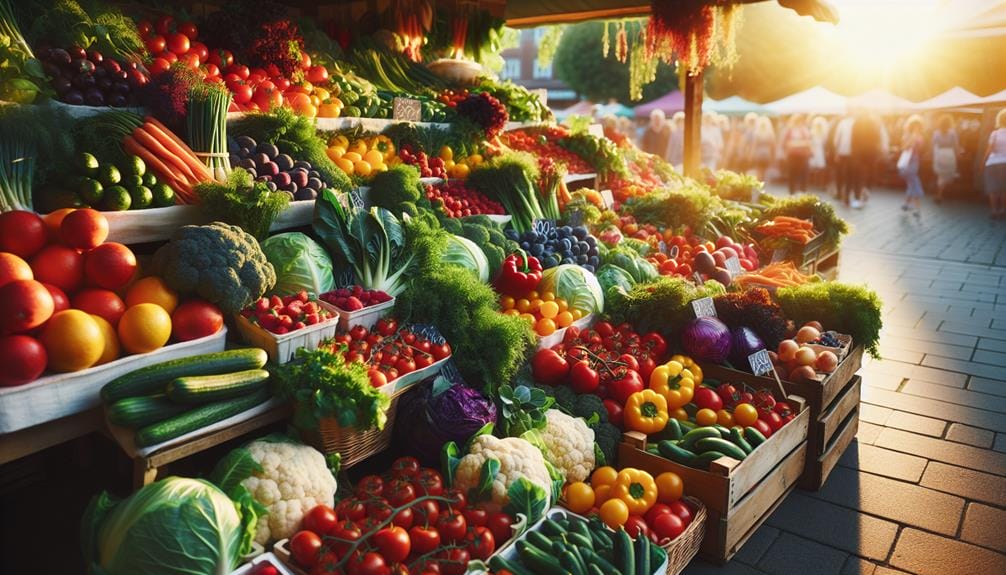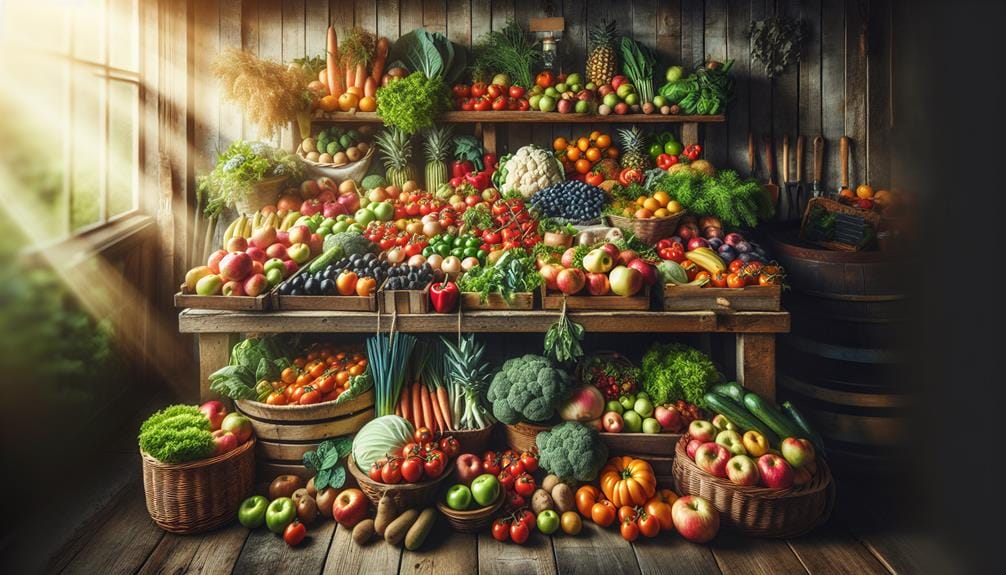Switching to organic food provides numerous advantages. You'll benefit from higher levels of essential antioxidants, vitamins, and minerals, boosting your overall well-being and reducing the risk of chronic diseases. Organic foods offer sustained energy without the crashes, thanks to complex carbohydrates and fiber. They promote humane treatment of animals and a reduction in harmful pollutants, supporting environmental health. Additionally, organic foods are GMO-free, free of synthetic hormones or antibiotics, and deliver superior taste due to natural fertilizers and rich soil. For more insights and detailed benefits, explore further.
Key Takeaways
- Organic foods offer higher levels of essential antioxidants, vitamins, and minerals, promoting overall well-being.
- Consuming organic products reduces the risk of chronic diseases like diabetes and cancer.
- Organic farming supports humane animal treatment, avoiding synthetic hormones and antibiotics.
- Organic agriculture benefits the environment by reducing pollution and promoting soil fertility.
- Organic foods guarantee GMO-free options, supporting sustainable agriculture practices.
Improved Health
Switching to organic foods can greatly enhance your health by providing higher levels of essential antioxidants, vitamins, and minerals. Think of it as upgrading your body's software with the latest nutrient-rich updates.
By eating organic, you're not just dodging synthetic chemicals, you're also reducing your risk of chronic diseases like diabetes and cancer. Who knew that munching on organic kale could be your secret weapon against health villains?
Plus, these foods pack a punch in the antioxidant department, helping you fight off those pesky free radicals. So, if you're looking to boost your well-being, ditch the artificial and embrace the organic.
Increased Energy Levels

Imagine this: you're a well-oiled machine, thanks to organic food. The higher nutrient content and absence of artificial additives mean you're not just running; you're sprinting through your day.
Say goodbye to those afternoon slumps! Organic foods provide complex carbohydrates and fiber, ensuring sustained energy without the dreaded sugar crash.
With cleaner, nutrient-rich options fueling your body, you'll feel like you've had a triple espresso—minus the jittery side effects.
Animal Welfare
When you choose organic products, you're actively supporting humane treatment and better living conditions for animals.
Organic livestock farms are like animal resorts—minus the room service. These farms uphold ethical standards that prioritize animal welfare, ensuring animals are treated with compassion and respect.
No synthetic hormones or antibiotics here, folks! Instead, animals munch on organic diets and roam outdoor areas, living their best lives.
By opting for organic, you're not just getting fresher, cleaner products; you're also voting for a kinder, gentler food production process.
Environmental Impact

Choosing organic products greatly benefits the environment by reducing pollution and conserving water. Organic farming skips the toxic pesticides, letting you enjoy food without playing chemical roulette.
By steering clear of synthetic nasties, it promotes soil fertility, making sure that dirt stays happy and healthy. Plus, it supports ecological balance, giving a nod to Mother Nature's intricate dance.
When you opt for organic, you're also shrinking your carbon footprint. Conventional farming methods tend to leave a heavy carbon trail, but organic practices keep it lighter than a feather.
Superior Taste
Embracing organic food means savoring rich, natural flavors that stand out in every bite. Organic foods taste better because they're grown in healthy soil, using natural fertilizers that give plants their best shot at flavor glory.
Imagine biting into a tomato that doesn't taste like a water balloon—it's like a tiny party for your taste buds!
Organic food reduces the need for artificial additives, letting the natural taste shine through. When crops aren't stressed out by chemicals and genetic modifications, they grow into healthy plants that deliver an improved taste.
Nutrient-Rich Foods

Switching to organic foods means you're choosing options that are richer in essential nutrients like vitamins, minerals, and antioxidants. Studies indicate that organic crops can contain up to 69% more antioxidants compared to their conventional counterparts.
Additionally, organic farming practices result in fewer pesticide residues, contributing to a healthier and more nutrient-dense diet.
Higher Nutrient Content
Organic foods pack a punch with higher levels of essential nutrients like vitamins, minerals, and antioxidants compared to their conventionally grown counterparts. Imagine biting into organic fruits and vegetables that aren't only delicious but also bursting with nutrient content.
They've got up to 69% more antioxidants, which help you fight off those pesky free radicals. The secret? The absence of synthetic pesticides lets plants absorb more essential nutrients from the soil, making them true nutritional powerhouses.
Fewer Pesticide Residues
Opting for organic foods means you're greatly decreasing your exposure to harmful pesticide residues found in conventionally grown produce. By choosing organic produce, you're dodging synthetic chemicals linked to various health issues like cancer, hormone disruption, and neurological problems. Plus, organic farming relies on natural pest control methods, giving you nutrient-rich foods without the nasty extras.
Here are a few perks of going organic:
- Less pesticide residue: Organic produce has 48% lower levels of pesticide residues.
- Better health: Reduced exposure to harmful chemicals supports your overall well-being.
- Eco-friendly: Natural pest control methods are better for the environment.
Local Economy Support

By choosing organic foods, you directly support local farmers and boost the local economy. It's like giving a high-five to the folks who grow your food. You're not just filling your basket; you're building a sustainable local economy.
Plus, you're promoting food security by ensuring these local farmers stay in business. Imagine the community bond you're strengthening every time you buy that organic apple or carrot. Local farmers get a fair shot, and your money stays in the neighborhood, creating a ripple effect of awesomeness.
It's a win-win: you get fresh, organic produce, and your community thrives. So go ahead, shop organic, and watch your local economy flourish like never before!
Avoiding Pesticides

Switching to organic food means you'll reduce your exposure to harmful synthetic pesticides.
Organic farming uses natural pest control methods, which not only protect your health but also promote healthier soil.
Reduced Chemical Exposure
Opting for organic foods greatly decreases your exposure to harmful synthetic pesticides and herbicides. Unlike conventional farming, which often leaves your food marinated in a cocktail of chemicals, organic farming sticks to strict, no-nonsense guidelines to keep things clean.
Here's why you should make the switch:
- Less Chemical Exposure: Organic foods reduce your intake of toxic pesticides, which conventional produce can't promise.
- Healthier Choices: Consuming organic food means fewer chemical residues, lowering potential long-term health risks.
- Environmental Impact: By going organic, you support farming practices that don't pollute the environment with harmful chemicals.
Healthier Soil Practices
Choosing organic foods not only reduces chemical exposure but also supports healthier soil practices by avoiding synthetic pesticides. Think of organic agriculture as a spa day for the soil.
Without synthetic pesticides, the soil remains rich and vibrant, teeming with beneficial soil microorganisms that are basically the soil's personal trainers. These tiny heroes help maintain healthy soil, making it fertile and nutrient-rich.
Organic farming methods focus on building soil fertility naturally, sidestepping artificial shortcuts. By embracing sustainable soil practices, organic farmers guarantee that their soil stays productive for the long haul.
Environmental Impact Reduction
By embracing organic farming, we can greatly diminish the environmental impact of harmful pesticides. When you opt for organic, you're not just getting healthier food; you're also doing Mother Earth a solid.
Organic farming practices sidestep synthetic pesticides, which means:
- Healthier soil: No chemical overload, just nutrient-rich goodness.
- Biodiversity boost: More plants and critters thrive without pesticide exposure.
- Cleaner air and water: Less chemical runoff means fewer pollutants.
Imagine fewer bees buzzing off to an early grave and more critters living their best lives. By choosing organic, you contribute to environmental impact reduction and a more balanced ecosystem.
GMO-Free Options

Opting for organic guarantees you avoid GMOs, which can result in nutritional deficiencies and generate new toxins. Genetically modified organisms are the unwanted guests at your dinner table, and organic farming practices make sure they don't crash the party.
By avoiding GMOs, you're not just dodging a nutritional nightmare, you're also supporting sustainable agricultural practices. Think of it as a double whammy of goodness—healthier you, happier planet!
Plus, going organic means your veggies won't secretly be plotting against you with new, mysterious toxins. So, toss those GMOs aside, embrace the organic lifestyle, and enjoy the peace of mind that comes with knowing your food is free from genetic shenanigans. Your body and Mother Earth will thank you!
Antibiotic-Free Meat

Organic meat provides you with an antibiotic-free option, reducing the risk of antibiotic resistance and promoting better health. When you opt for organic meat, you're not just making a choice for yourself but also for the planet and the animals. Here's why:
- Animal Welfare: Animals aren't routinely given antibiotics, ensuring they live healthier, happier lives.
- Sustainable Farming Practices: Organic farming prioritizes animal health and avoids harmful chemicals.
- No Growth Hormones: Organic meat production prohibits growth hormones, so you're not getting any surprise additives.
In a nutshell, choosing organic meat means you're supporting sustainable farming practices and promoting better animal welfare, all while keeping those pesky growth hormones out of your diet. Plus, who doesn't want healthier, happier animals?
Conclusion
Switching to organic food offers numerous benefits, including improved health and increased energy levels. By choosing organic, you support animal welfare, reduce environmental impact, and enjoy superior taste.
Additionally, you'll help boost the local economy and avoid harmful pesticides and GMOs. Organic meats are also antibiotic-free, contributing to better overall health. While some debate remains about the extent of these benefits, the evidence strongly suggests that organic choices lead to a healthier and more sustainable lifestyle.









Leave a Comment